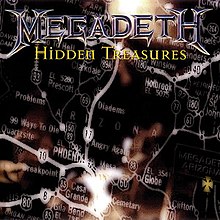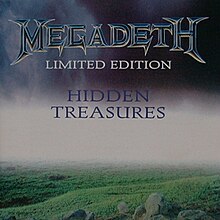
Megadeth is an American thrash metal band formed in Los Angeles in 1983 by vocalist/guitarist Dave Mustaine. Known for their technically complex guitar work and musicianship, Megadeth is one of the "big four" of American thrash metal along with Metallica, Anthrax, and Slayer, responsible for the genre's development and popularization. Their music features complex arrangements and fast rhythm sections, dual lead guitars, and lyrical themes of war, politics, religion, death, and personal relationships.

Killing Is My Business... and Business Is Good! is the debut studio album by American thrash metal band Megadeth, released on June 12, 1985, by Combat Records. At the beginning of 1985, the band was given $8,000 by Combat to record and produce its debut album. The band was forced to fire their original producer and produce the album by themselves, after spending half of the album's budget on drugs, alcohol, and food. Despite the poor production, the album was a well-received effort that obtained strong reviews in various music publications. Killing Is My Business... and Business Is Good! played an essential role in establishing thrash metal as an authentic subgenre of heavy metal music. It explores themes of death, occultism, and violence.

Peace Sells... but Who's Buying? is the second studio album by American thrash metal band Megadeth, released on September 19, 1986, through Capitol Records. The project was originally handled by Combat Records, resulting in the original mix of the album being co-produced by Randy Burns. Capitol Records then bought the rights to the album and hired another producer named Paul Lani to mix it himself. The recording of the album was difficult for the band, because of the ongoing drug issues the members had at the time. Drummer Gar Samuelson and guitarist Chris Poland were fired shortly after the album's promotional tour for drug abuse, making Peace Sells Samuelson's last Megadeth album. Poland reappeared as a session musician on Megadeth's 2004 album The System Has Failed. The title track, noted for its politically conscious lyrics, was released as the album's second single and was the band's first music video. The album's cover art, featuring the band's mascot Vic Rattlehead in front of a desolated United Nations Headquarters, was created by Ed Repka.

Rust in Peace is the fourth studio album by American thrash metal band Megadeth, released on September 24, 1990, by Capitol Records. It was the first Megadeth album to feature guitarist Marty Friedman and drummer Nick Menza. The songs "Hangar 18" and "Holy Wars... The Punishment Due" were released as singles. A remixed and remastered version of the album featuring four bonus tracks was released in 2004.

Countdown to Extinction is the fifth studio album by American thrash metal band Megadeth, released on July 14, 1992, through Capitol Records. It was the group's second studio release to feature the "classic" lineup of Dave Mustaine, Marty Friedman, David Ellefson and Nick Menza, with all of them contributing to songwriting on the album. The album features some of the band's best known songs such as "Symphony of Destruction", "Sweating Bullets", and "Skin o' My Teeth", which enjoyed significant chart success and made a great musical impact.

Youthanasia is the sixth studio album by American heavy metal band Megadeth, released on November 1, 1994, through Capitol Records. It is stylistically similar to their previous album, Countdown to Extinction (1992). The title is a play on words, implying that society is euthanizing its youth. The cover art features an elderly woman hanging babies by their feet on a seemingly endless clothes line, a direct reference to a line in the title track.

Cryptic Writings is the seventh studio album by American heavy metal band Megadeth. Released on June 17, 1997, through Capitol Records, it was the band's last studio album to feature drummer Nick Menza. His departure would mark the end of the band's longest lasting lineup to date, having recorded four studio albums. Megadeth decided to produce the record with Dann Huff in Nashville, Tennessee, because they were not satisfied with their previous producer Max Norman. The album features twelve tracks with accessible song structures, specifically aimed for radio airplay. The lyrics were also altered, in order to make the music more inclusive for wider audience. These changes were met with mixed opinions from music critics, who noted the band moving away from their thrash metal roots.
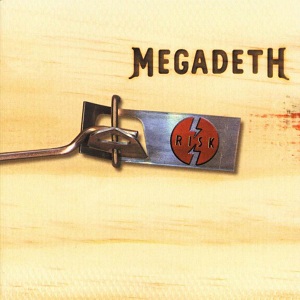
Risk is the eighth studio album by American heavy metal band Megadeth, released on August 31, 1999, by Capitol Records, the band's last album to be released by the label. The first Megadeth album since 1990 to feature a lineup change, Risk marks the studio debut of drummer Jimmy DeGrasso with the band, as well as the final appearance of longtime guitarist Marty Friedman, who announced his departure a year later. Meant to be a breakthrough on alternative rock radio, Risk received a mixed response because of the great deviation from the band's traditional sound. The backlash ultimately resulted with the band returning towards a heavier sound with their next album.

The World Needs a Hero is the ninth studio album by American thrash metal band Megadeth, released on May 15, 2001, by Sanctuary Records. After the critical and commercial failure of the previous album Risk (1999), The World Needs a Hero represented a change back to a heavier musical direction. Subsequently, the album charted at number 16 on the Billboard 200 upon release.

David Scott Mustaine is an American musician. He is the co-founder, frontman, primary songwriter and sole consistent member of the thrash metal band Megadeth. Mustaine has released sixteen studio albums with Megadeth, sold over 38 million records worldwide, with six albums platinum-certified, and won a Grammy Award for Best Metal Performance in 2017 at the 59th Grammy Awards, for the title track of their fifteenth studio album, Dystopia.
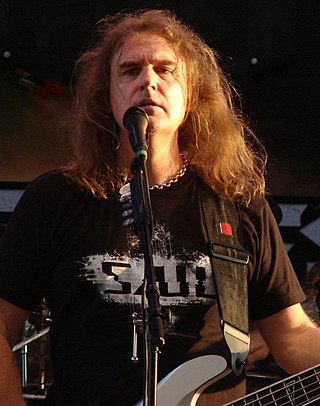
David Warren Ellefson is an American musician, best known for his long tenure as the bassist for thrash metal band Megadeth.

Chris Poland is an American guitarist, best known as the former guitarist of the thrash metal band Megadeth. Since 2002, Poland has been the guitarist of the instrumental rock/jazz fusion bands OHM and OHMphrey, among others, and has appeared on several projects and albums from a variety of different genres.

"A Tout le Monde" is a song by American heavy metal band Megadeth, featured on their 1994 studio album Youthanasia. It was released as a single in February 1995 through Capitol Records. The song was later remade and reissued as "À Tout le Monde ", featuring Cristina Scabbia of Lacuna Coil, on Megadeth's 2007 studio album United Abominations. The song's chorus, "à tout le monde, à tous mes amis, je vous aime, je dois partir", prompted controversy after accusations that it was pro-suicide.

American thrash metal band Megadeth has released sixteen studio albums, six live albums, seven compilation albums, one EP, fifty-nine singles, ten video albums, and fifty music videos. After he was fired from Metallica in 1983, guitarist and vocalist Dave Mustaine formed Megadeth along with bassist Dave Ellefson, guitarist Greg Handevidt, and drummer Richard Girod. After some initial lineup changes during 1984, Megadeth's lineup was cemented, consisting of guitarist Dave Mustaine, bassist Dave Ellefson, guitarist Chris Poland, and drummer Gar Samuelson. The band toured and gained a following, signing with the independent label Combat Records in late 1984. Megadeth's debut album Killing Is My Business... and Business Is Good! (1985), sold very well for an independent release, and the group attracted the attention of major record labels. By the end of the year, the group signed with Capitol Records. Megadeth's first major-label album, Peace Sells... but Who's Buying?, was released in 1986.

"99 Ways to Die" is a song by the American thrash metal band Megadeth. The song was recorded for the soundtrack to The Beavis and Butt-head Experience, and was released as a single and a music video. The song was nominated in the "Best Metal Performance" category at the 1995 Grammy Awards.
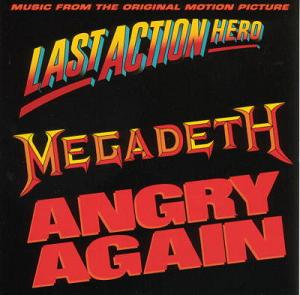
"Angry Again" is a 1993 heavy metal song by Megadeth, written by frontman Dave Mustaine. The song was written exclusively for inclusion in the 1993 satirical action film Last Action Hero, directed by John McTiernan and starring Arnold Schwarzenegger. The track featured on the film's soundtrack. "Angry Again" never appeared on any of the band's official studio albums but was included on their 1995 EP, Hidden Treasures, and several later compilations.

"Sudden Death" is a song by American heavy metal band Megadeth. It was written by Dave Mustaine for inclusion in the 2010 music video game Guitar Hero: Warriors of Rock, which was released on September 28, 2010, in North America. The song itself was released as a single with cover art on iTunes on September 24, 2010, and on September 28, Roadrunner Records made the song available for streaming on its website.

Thirteen is the thirteenth studio album by American thrash metal band Megadeth. It was first released in Japan on October 27, 2011, and worldwide on November 1, 2011. It is the first Megadeth studio album since The World Needs a Hero (2001) to feature bassist and founding member David Ellefson, who returned to the band in 2010. Thirteen debuted at number 11 on the Billboard 200 chart, selling 42,000 copies in its first week. The album broke into the top 20 in several other markets as well. It has sold about 120,000 copies in the United States as of December 2012. The album has received positive reviews from critics.

Dystopia is the fifteenth studio album by American thrash metal band Megadeth. It was released on frontman and guitarist Dave Mustaine's Tradecraft label via Universal on January 22, 2016. It is the first Megadeth album to feature guitarist Kiko Loureiro, the only album with drummer Chris Adler, and their last with bassist David Ellefson. The album was produced by Mustaine and Chris Rakestraw and features cover artwork by Brent Elliot White.
